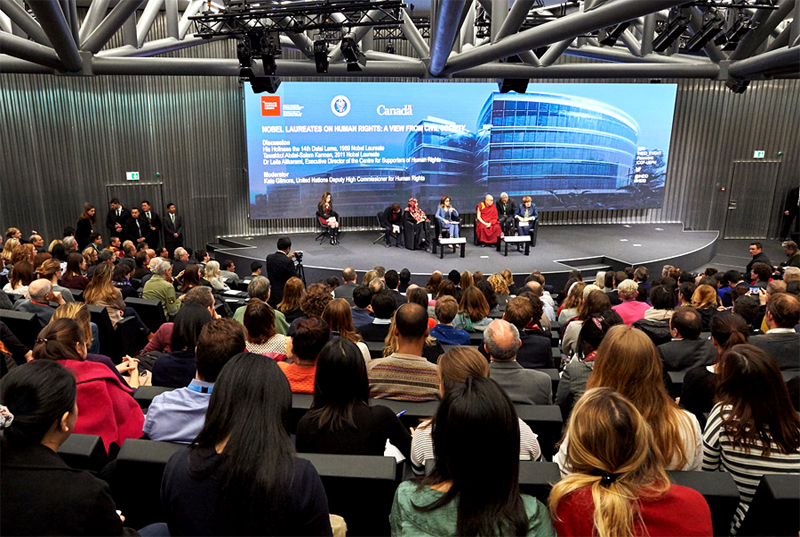 Geneva — Reiterating that people of Tibet are not seeking independence from China but "genuine autonomy" for Tibet, His Holiness the Dalai Lama said China's new leadership should use "common sense" and seek truth from fact.
Geneva — Reiterating that people of Tibet are not seeking independence from China but "genuine autonomy" for Tibet, His Holiness the Dalai Lama said China's new leadership should use "common sense" and seek truth from fact.
His Holiness took part in a panel of Nobel Peace Prize laureates in Geneva on Friday (March 12), addressing a full auditorium about Chinese repression in his native Tibet despite Beijing having urged people to shun the event.
"One part of the human brain usually develops common sense. Some of these (Chinese) hardliners, that part of brain is missing," the spiritual leader of Tibetan people, told the audience of students and diplomats.
Earlier he told reporters: "Wherever my name is there they usually criticise and protest. That's quite now routine, normal, nothing special."
China's Foreign Ministry said in statement it had lodged a protest with the United States, which along with Canada had sponsored the event, and that it had expressed its "strong dissatisfaction" with Washington.
China's UN mission in Geneva circulated a letter to other missions asking them to avoid the Tibetan spiritual leader's appearance at a conference built around Nobel peace prize winners and co-sponsored by the United States and Canada.
Hundreds of supporters of the Tibetan spiritual leader, some waving Tibetan flags, rallied at the giant three-legged chair landmark outside the UN complex as he attended the packed-house conference nearby at Geneva's Graduate Institute. The number of diplomats in the throng was unclear.
The Chinese mission's letter dated Tuesday, the same day that press invitations for the conference were made, said the event was "of grave concern to China."
It called the Dalai Lama "a political exile who has long been engaged in activities to split China under the pretext of religion," and said the mission "kindly requests the permanent missions of all member states, UN agencies and relevant international organizations not to attend the above-mentioned event."
Referring to Tibet, His Holiness the Dalai Lama told the conference: "We are not seeking separation" from China. However, he referred to a "totalitarian system" and "hardliners" in China. He said he had heard from some in China that change "may happen" at the 19th Communist Party meeting next year, though he did not elaborate.
Afterward, about a dozen heavily-armed police stood watch as the Dalai Lama glad-handed the crowd outside the and addressing the supporters in Tibetan — primarily on religious and spiritual themes, according to attendees. Many were dressed in traditional costumes, and some danced.
The conference was billed as a side event to the ongoing UN Human Rights Council in Geneva, where the US and 11 other Western countries on Thursday expressed concerns about human rights in China, notably over the arrests of lawyers and activists in recent months, and "unexplained recent disappearances and apparent coerced returns" of Chinese citizens and foreigners to China.
At least 150 Tibetans have self-immolated in protest against the repressive Chinese occupation of Tibet. Of these, 143 did so within Tibet, while the remaining eight were living in exile and of them125 have died, including 124 within Tibet and five abroad.
Tibetan self-immolators have called for freedom of Tibetan people and the return of His Holiness the Dalai Lama to Tibet.
Over 1.2 million Tibetans have died as a direct result of the Chinese invasion and occupation of Tibet and The regime's continuous implementation of harsh policies to crackdown the freedom of Tibetans living inside Tibet have triggered Tibetans to resort to more extreme forms of resistance.
Most parts of Tibet have suffered severe crackdowns and been under heightened restrictions and controls in the past six decades, that China calls it a "peaceful liberation". But Tibetans describe a systematic repression, excluded from positions of power and imprisoned.


![Tibet has a rich history as a sovereign nation until the 1950s when it was invaded by China. [Photo: File]](/images/stories/Pics-2024/March/Tibet-Nation-1940s.jpg#joomlaImage://local-images/stories/Pics-2024/March/Tibet-Nation-1940s.jpg?width=1489&height=878)















